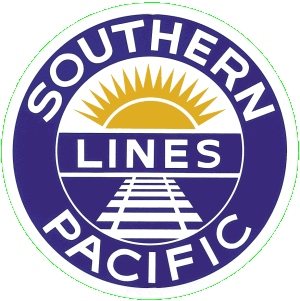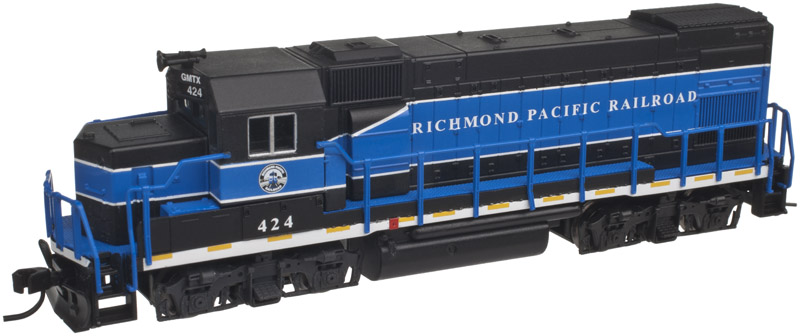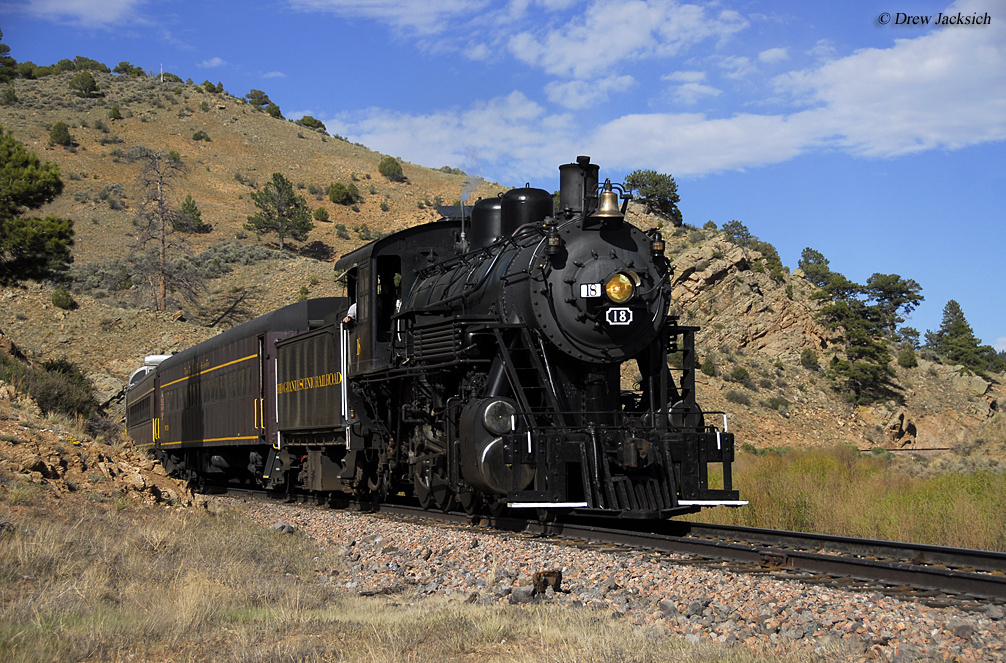Key - 115 - Locomotive, Steam, 2-8-0 Consolidation - Southern Pacific - 2842
| Stock Number | 115 |
| Brand | Key |
| Manufacturer | Samhongsa |
| Body Style | Samhongsa Steam Engine 2-8-0 |
| Prototype Vehicle | Locomotive, Steam, 2-8-0 Consolidation (Details) |
| Road or Company Name | Southern Pacific (Details) |
| Road or Reporting Number | 2842 |
| Paint Color(s) | Black |
| Print Color(s) | White |
| Coupler Type | Rapido Hook |
| Wheel Type | Nickel-Silver Plated Metal |
| Wheel Profile | Small Flange (Low Profile) |
| DCC Readiness | No |
| Item Category | Locomotives |
| Model Type | Steam Engine |
| Model Subtype | 2-8-0 |
| Model Variety | Mountain |
| Prototype Region | North America |
| Prototype Era | NA Era I: Early Steam (1835 - 1900) |
| Scale | 1/160 |
Specific Item Information:
Custom Series #115 - Made in Korea by Samhongsa
Prototype History:
Under the Whyte notation for the classification of steam locomotives, 2-8-0 represents the wheel arrangement of two leading wheels on one axle, usually in a leading truck, eight powered and coupled driving wheels on four axles and no trailing wheels. In the United States and elsewhere, this wheel arrangement is commonly known as a Consolidation.
Of all the locomotive types that were created and experimented with in the 19th century, the 2-8-0 was a relative latecomer. From its introduction in 1866 and well into the early 20th century, the 2-8-0 design was considered to be the ultimate heavy-freight locomotive. The 2-8-0's forte was starting and moving "impressive loads at unimpressive speeds" and its versatility gave the type its longevity. The practical limit of the design was reached in 1915, when it was realized that no further development was possible with a locomotive of this wheel arrangement.
From Wikipedia
Of all the locomotive types that were created and experimented with in the 19th century, the 2-8-0 was a relative latecomer. From its introduction in 1866 and well into the early 20th century, the 2-8-0 design was considered to be the ultimate heavy-freight locomotive. The 2-8-0's forte was starting and moving "impressive loads at unimpressive speeds" and its versatility gave the type its longevity. The practical limit of the design was reached in 1915, when it was realized that no further development was possible with a locomotive of this wheel arrangement.
From Wikipedia
Road Name History:
 The Southern Pacific Transportation Company (reporting mark SP), earlier Southern Pacific Railroad and Southern Pacific Company, and usually called the Southern Pacific or (from the railroad's initials) Espee, was an American Class I railroad. It was absorbed in 1988 by the company that controlled the Denver and Rio Grande Western Railroad and eight years later became part of the Union Pacific Railroad.
The Southern Pacific Transportation Company (reporting mark SP), earlier Southern Pacific Railroad and Southern Pacific Company, and usually called the Southern Pacific or (from the railroad's initials) Espee, was an American Class I railroad. It was absorbed in 1988 by the company that controlled the Denver and Rio Grande Western Railroad and eight years later became part of the Union Pacific Railroad.
The railroad was founded as a land holding company in 1865, later acquiring the Central Pacific Railroad by lease. By 1900 the Southern Pacific Company was a major railroad system incorporating many smaller companies, such as the Texas and New Orleans Railroad and Morgan's Louisiana and Texas Railroad. It extended from New Orleans through Texas to El Paso, across New Mexico and through Tucson, to Los Angeles, through most of California, including San Francisco and Sacramento. Central Pacific lines extended east across Nevada to Ogden, Utah, and reached north through Oregon to Portland. Other subsidiaries eventually included the St. Louis Southwestern Railway (Cotton Belt), the Northwestern Pacific Railroad at 328 miles (528 km), the 1,331 miles (2,142 km) Southern Pacific Railroad of Mexico, and a variety of 3 ft (914 mm) narrow gauge routes.
In 1929 SP/T&NO operated 13848 route-miles not including Cotton Belt, whose purchase of the Golden State Route circa 1980 nearly doubled its size to 3,085 miles (4,965 km), bringing total SP/SSW mileage to around 13,508 miles (21,739 km).
By the 1980s route mileage had dropped to 10,423 miles (16,774 km), mainly due to the pruning of branch lines. In 1988 the Southern Pacific was taken over by D&RGW parent Rio Grande Industries. The combined railroad kept the Southern Pacific name due to its brand recognition in the railroad industry and with customers of both constituent railroads. Along with the addition of the SPCSL Corporation route from Chicago to St. Louis, the total length of the D&RGW/SP/SSW system was 15,959 miles (25,684 km).
By 1996 years of financial problems had dropped SP's mileage to 13,715 miles (22,072 km), and it was taken over by the Union Pacific Railroad.
Read more on Wikipedia.

The railroad was founded as a land holding company in 1865, later acquiring the Central Pacific Railroad by lease. By 1900 the Southern Pacific Company was a major railroad system incorporating many smaller companies, such as the Texas and New Orleans Railroad and Morgan's Louisiana and Texas Railroad. It extended from New Orleans through Texas to El Paso, across New Mexico and through Tucson, to Los Angeles, through most of California, including San Francisco and Sacramento. Central Pacific lines extended east across Nevada to Ogden, Utah, and reached north through Oregon to Portland. Other subsidiaries eventually included the St. Louis Southwestern Railway (Cotton Belt), the Northwestern Pacific Railroad at 328 miles (528 km), the 1,331 miles (2,142 km) Southern Pacific Railroad of Mexico, and a variety of 3 ft (914 mm) narrow gauge routes.
In 1929 SP/T&NO operated 13848 route-miles not including Cotton Belt, whose purchase of the Golden State Route circa 1980 nearly doubled its size to 3,085 miles (4,965 km), bringing total SP/SSW mileage to around 13,508 miles (21,739 km).
By the 1980s route mileage had dropped to 10,423 miles (16,774 km), mainly due to the pruning of branch lines. In 1988 the Southern Pacific was taken over by D&RGW parent Rio Grande Industries. The combined railroad kept the Southern Pacific name due to its brand recognition in the railroad industry and with customers of both constituent railroads. Along with the addition of the SPCSL Corporation route from Chicago to St. Louis, the total length of the D&RGW/SP/SSW system was 15,959 miles (25,684 km).
By 1996 years of financial problems had dropped SP's mileage to 13,715 miles (22,072 km), and it was taken over by the Union Pacific Railroad.
Read more on Wikipedia.
Manufacturer Information:
Samhongsa was a Korean manufacturer of model trains, well know for its brass models, imported notably by Hallmark Models. The company ceased its activity in the early 2000s. Some of the employees continued the brass model business as Sam Model Tech.
Item created by: gdm
on 2020-06-01 10:26:39
Last edited by: gdm on 2020-06-01 10:26:59
If you see errors or missing data in this entry, please feel free to log in and edit it. Anyone with a Gmail account can log in instantly.
Last edited by: gdm on 2020-06-01 10:26:59
If you see errors or missing data in this entry, please feel free to log in and edit it. Anyone with a Gmail account can log in instantly.










